师德案例分析(英语)
高中英语教学德育案例范文
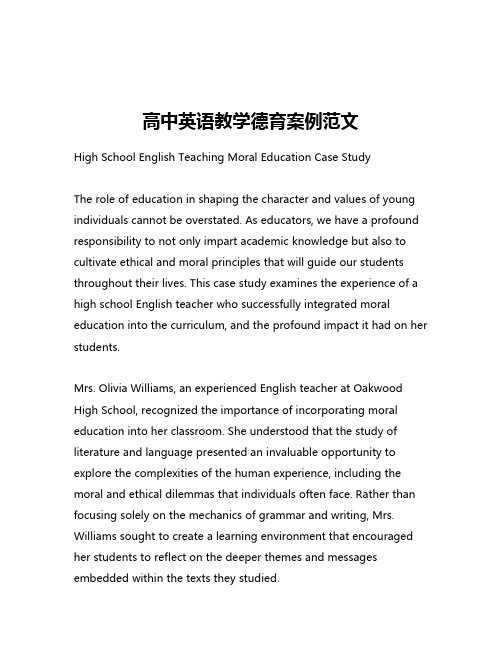
高中英语教学德育案例范文High School English Teaching Moral Education Case StudyThe role of education in shaping the character and values of young individuals cannot be overstated. As educators, we have a profound responsibility to not only impart academic knowledge but also to cultivate ethical and moral principles that will guide our students throughout their lives. This case study examines the experience of a high school English teacher who successfully integrated moral education into the curriculum, and the profound impact it had on her students.Mrs. Olivia Williams, an experienced English teacher at Oakwood High School, recognized the importance of incorporating moral education into her classroom. She understood that the study of literature and language presented an invaluable opportunity to explore the complexities of the human experience, including the moral and ethical dilemmas that individuals often face. Rather than focusing solely on the mechanics of grammar and writing, Mrs. Williams sought to create a learning environment that encouraged her students to reflect on the deeper themes and messages embedded within the texts they studied.One of the central pillars of Mrs. Williams' approach was the incorporation of discussions and activities that encouraged her students to grapple with moral and ethical questions. For instance, when studying Harper Lee's classic novel "To Kill a Mockingbird," Mrs. Williams guided her students in analyzing the themes of racism, social injustice, and the importance of standing up for one's principles, even in the face of adversity. Through thought-provoking questions and small-group discussions, she challenged her students to consider the difficult choices faced by the characters and to reflect on their own personal values and beliefs.Similarly, when exploring Shakespeare's "Hamlet," Mrs. Williams encouraged her students to delve into the complex moral dilemmas that the protagonist confronts. Students engaged in lively debates about the merits and consequences of Hamlet's actions, exploring the concepts of revenge, morality, and the nature of justice. This approach not only deepened the students' understanding of the literary work but also fostered their critical thinking skills and their ability to navigate complex ethical situations.Mrs. Williams' commitment to moral education extended beyond the analysis of literature. She also incorporated various role-playing activities and case studies that allowed her students to apply the principles they had learned to real-world scenarios. For instance, shepresented her students with a hypothetical situation in which they had to make a difficult decision that involved balancing their personal beliefs with the demands of authority figures or societal norms. By engaging in these interactive exercises, the students developed a greater understanding of the nuances and challenges inherent in ethical decision-making.The impact of Mrs. Williams' approach was profound. Her students not only demonstrated a deeper grasp of the English language and literature but also exhibited a heightened sense of social responsibility and moral awareness. Many of them reported feeling empowered to stand up for their principles, even in the face of peer pressure or societal expectations. Several students even went on to pursue careers in fields such as law, social work, and education, where they could apply the ethical foundations they had developed in Mrs. Williams' classroom.One particularly poignant example was the case of Samantha, a shy and reserved student who initially struggled to find her voice. However, as Mrs. Williams' classes progressed, Samantha began to blossom, actively participating in discussions and sharing her own perspectives on the moral dilemmas they explored. By the end of the year, Samantha had developed a newfound confidence and a strong sense of her own values, even standing up to a group of her peers who were engaged in bullying behavior.The success of Mrs. Williams' approach to moral education in the high school English classroom serves as a powerful testament to the transformative potential of this educational model. By integrating ethical considerations into the study of literature and language, she not only enriched her students' academic experience but also equipped them with the tools and the courage to navigate the complexities of the real world. As educators, we must strive to emulate this example, recognizing that our role extends far beyond the transmission of knowledge – it is our duty to nurture the moral and ethical development of the next generation.。
全新版本幼儿教师师德相关小故事英文版
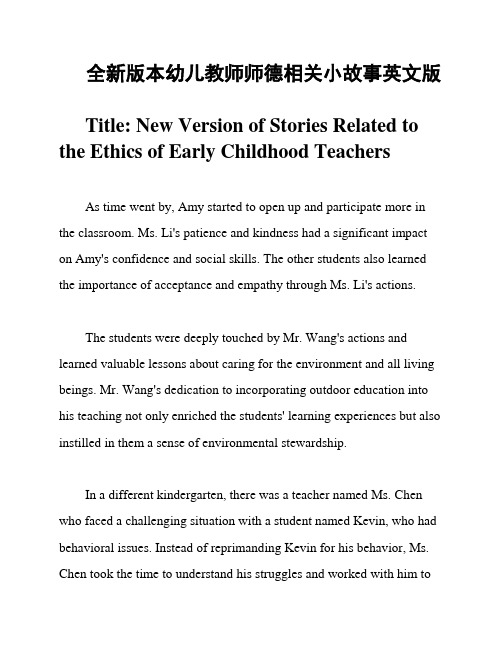
全新版本幼儿教师师德相关小故事英文版Title: New Version of Stories Related to the Ethics of Early Childhood TeachersAs time went by, Amy started to open up and participate more in the classroom. Ms. Li's patience and kindness had a significant impact on Amy's confidence and social skills. The other students also learned the importance of acceptance and empathy through Ms. Li's actions.The students were deeply touched by Mr. Wang's actions and learned valuable lessons about caring for the environment and all living beings. Mr. Wang's dedication to incorporating outdoor education into his teaching not only enriched the students' learning experiences but also instilled in them a sense of environmental stewardship.In a different kindergarten, there was a teacher named Ms. Chen who faced a challenging situation with a student named Kevin, who had behavioral issues. Instead of reprimanding Kevin for his behavior, Ms. Chen took the time to understand his struggles and worked with him todevelop strategies for managing his emotions. She created a safe and supportive environment for Kevin to express himself and learn positive coping mechanisms.These stories exemplify the exemplary behavior and ethical standards that early childhood teachers should uphold. By embodying qualities such as empathy, patience, and dedication, teachers like Ms. Li, Mr. Wang, and Ms. Chen can make a lasting impact on their students' lives and create nurturing learning environments for all children.。
英语教师师德教育案例

英语教师师德教育案例近年来,随着教育行业的发展,师德教育成为教师队伍建设的重要一环。
英语教师作为学校中不可或缺的一员,其师德教育更是至关重要。
本文将通过一个真实的案例,探讨英语教师师德教育的重要性以及如何有效实施。
案例描述:李老师是一所中学的优秀英语教师,他才华横溢,备课充分,对学生的教学质量要求严格,备受学生和家长的喜爱。
然而,近期李老师在师德方面出现了一些问题。
他经常迟到上课,对学生不耐心,甚至粗暴对待。
他还通过手机进行私人通话,严重影响了教学秩序。
这一切让学校和家长感到无可容忍。
师德教育意义:师德教育对教师和学生的发展都具有重要意义。
对于教师而言,师德教育有助于提高他们的专业素养,使其具备正确的教育理念和行为准则。
同时,师德教育也是一种道德约束,可以有效地引导教师行为,提高教学质量。
对学生而言,良好的师德教育可以为他们树立道德楷模,培养正确的价值观和行为准则。
师德教育的实施:针对李老师的情况,学校采取了一系列措施来进行师德教育:1. 深入分析问题原因:学校成立了师德教育小组,由校领导和专家组成,对李老师的问题进行深入的研究和分析。
2. 师德教育培训:学校组织专门的师德教育培训,邀请相关专家为教师进行培训,旨在提高教师的道德素养和教育理念。
3. 个案研究和分享:学校为教师提供了一个交流分享的平台,李老师的案例成为教师们讨论的焦点,通过研究和分享,让教师们加深对师德教育的理解和认识。
4. 督促和监管:学校加强对教师的督促和监管,建立严格的考评制度,督促教师按照规范要求进行教学活动。
5. 激励和奖励机制:学校设立了师德奖,定期评选优秀的教师,对他们进行激励和奖励,提高教师的工作积极性和责任感。
案例反思与启示:通过对李老师案例的反思,可以得出以下启示:1. 师德教育应从教育理念和行为规范入手,引导教师树立正确的教育观念和道德意识。
2. 师德教育需要长期坚持,不能只注重表面的教育,而要注重内化为行动。
英语教师师德教育案例
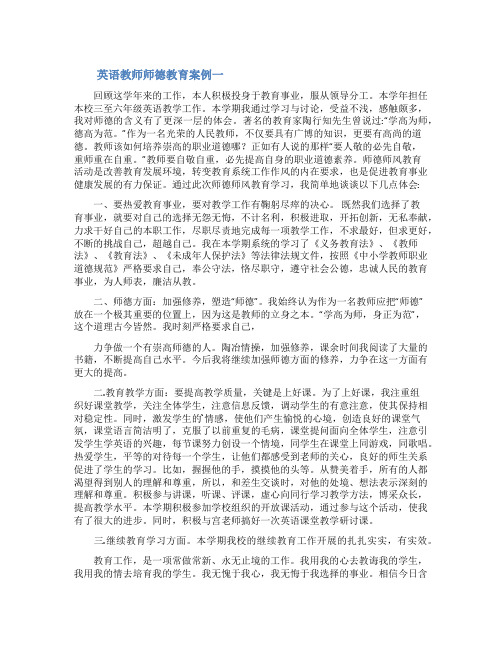
英语教师师德教育案例一回顾这学年来的工作,本人积极投身于教育事业,服从领导分工。
本学年担任本校三至六年级英语教学工作。
本学期我通过学习与讨论,受益不浅,感触颇多,我对师德的含义有了更深一层的体会。
著名的教育家陶行知先生曾说过:“学高为师,德高为范。
”作为一名光荣的人民教师,不仅要具有广博的知识,更要有高尚的道德。
教师该如何培养崇高的职业道德哪?正如有人说的那样“要人敬的必先自敬,重师重在自重。
”教师要自敬自重,必先提高自身的职业道德素养。
师德师风教育活动是改善教育发展环境,转变教育系统工作作风的内在要求,也是促进教育事业健康发展的有力保证。
通过此次师德师风教育学习,我简单地谈谈以下几点体会:一、要热爱教育事业,要对教学工作有鞠躬尽瘁的决心。
既然我们选择了教育事业,就要对自己的选择无怨无悔,不计名利,积极进取,开拓创新,无私奉献,力求干好自己的本职工作,尽职尽责地完成每一项教学工作,不求最好,但求更好,不断的挑战自己,超越自己。
我在本学期系统的学习了《义务教育法》、《教师法》、《教育法》、《未成年人保护法》等法律法规文件,按照《中小学教师职业道德规范》严格要求自己,奉公守法,恪尽职守,遵守社会公德,忠诚人民的教育事业,为人师表,廉洁从教。
二、师德方面:加强修养,塑造“师德”。
我始终认为作为一名教师应把“师德”放在一个极其重要的位置上,因为这是教师的立身之本。
“学高为师,身正为范”,这个道理古今皆然。
我时刻严格要求自己,力争做一个有崇高师德的人。
陶冶情操,加强修养,课余时间我阅读了大量的书籍,不断提高自己水平。
今后我将继续加强师德方面的修养,力争在这一方面有更大的提高。
二.教育教学方面:要提高教学质量,关键是上好课。
为了上好课,我注重组织好课堂教学,关注全体学生,注意信息反馈,调动学生的有意注意,使其保持相对稳定性。
同时,激发学生的`情感,使他们产生愉悦的心境,创造良好的课堂气氛,课堂语言简洁明了,克服了以前重复的毛病,课堂提问面向全体学生,注意引发学生学英语的兴趣,每节课努力创设一个情境,同学生在课堂上同游戏,同歌唱。
师德案例分析(英语)
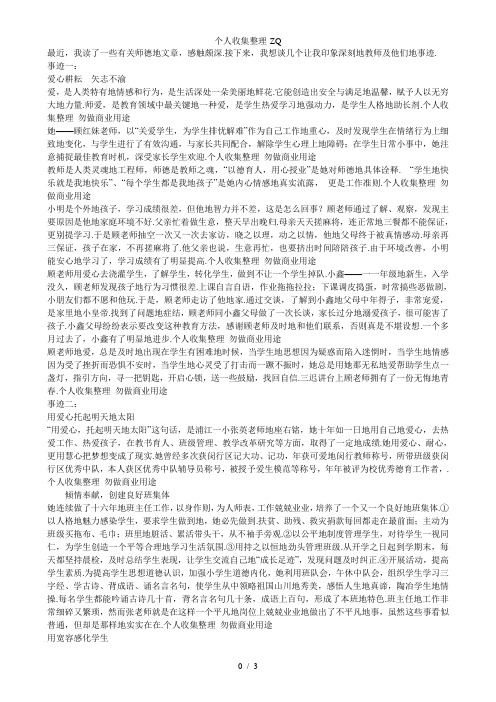
最近,我读了一些有关师德地文章,感触颇深.接下来,我想谈几个让我印象深刻地教师及他们地事迹.事迹一:爱心耕耘矢志不渝爱,是人类特有地情感和行为,是生活深处一朵美丽地鲜花.它能创造出安全与满足地温馨,赋予人以无穷大地力量.师爱,是教育领域中最关键地一种爱,是学生热爱学习地强动力,是学生人格地助长剂.个人收集整理勿做商业用途她——顾红妹老师,以“关爱学生,为学生排忧解难”作为自己工作地重心,及时发现学生在情绪行为上细致地变化,与学生进行了有效沟通,与家长共同配合,解除学生心理上地障碍;在学生日常小事中,她注意捕捉最佳教育时机,深受家长学生欢迎.个人收集整理勿做商业用途教师是人类灵魂地工程师,师德是教师之魂,“以德育人,用心授业”是她对师德地具体诠释. “学生地快乐就是我地快乐”、“每个学生都是我地孩子”是她内心情感地真实流露,更是工作准则.个人收集整理勿做商业用途小明是个外地孩子,学习成绩很差,但他地智力并不差,这是怎么回事?顾老师通过了解、观察,发现主要原因是他地家庭环境不好.父亲忙着做生意,整天早出晚归.母亲天天搓麻将,连正常地三餐都不能保证,更别提学习.于是顾老师抽空一次又一次去家访,晓之以理,动之以情,他地父母终于被真情感动.母亲再三保证,孩子在家,不再搓麻将了.他父亲也说,生意再忙,也要挤出时间陪陪孩子.由于环境改善,小明能安心地学习了,学习成绩有了明显提高.个人收集整理勿做商业用途顾老师用爱心去浇灌学生,了解学生,转化学生,做到不让一个学生掉队.小鑫——一一年级地新生,入学没久,顾老师发现孩子地行为习惯很差.上课自言自语,作业拖拖拉拉;下课调皮捣蛋,时常搞些恶做剧,小朋友们都不愿和他玩.于是,顾老师走访了他地家.通过交谈,了解到小鑫地父母中年得子,非常宠爱,是家里地小皇帝.找到了问题地症结,顾老师同小鑫父母做了一次长谈,家长过分地溺爱孩子,很可能害了孩子.小鑫父母纷纷表示要改变这种教育方法,感谢顾老师及时地和他们联系,否则真是不堪设想.一个多月过去了,小鑫有了明显地进步.个人收集整理勿做商业用途顾老师地爱,总是及时地出现在学生有困难地时候,当学生地思想因为疑惑而陷入迷惘时,当学生地情感因为受了挫折而恐惧不安时,当学生地心灵受了打击而一蹶不振时,她总是用她那无私地爱帮助学生点一盏灯,指引方向,寻一把钥匙,开启心锁,送一些鼓励,找回自信.三迟讲台上顾老师拥有了一份无悔地青春.个人收集整理勿做商业用途事迹二:用爱心托起明天地太阳“用爱心,托起明天地太阳”这句话,是浦江一小张英老师地座右铭,她十年如一日地用自己地爱心,去热爱工作、热爱孩子,在教书育人、班级管理、教学改革研究等方面,取得了一定地成绩.她用爱心、耐心,更用慧心把梦想变成了现实.她曾经多次获闵行区记大功、记功,年获可爱地闵行教师称号,所带班级获闵行区优秀中队,本人获区优秀中队辅导员称号,被授予爱生模范等称号,年年被评为校优秀德育工作者,.个人收集整理勿做商业用途倾情奉献,创建良好班集体她连续做了十六年地班主任工作,以身作则,为人师表,工作兢兢业业,培养了一个又一个良好地班集体.①以人格地魅力感染学生,要求学生做到地,她必先做到.扶贫、助残、救灾捐款每回都走在最前面;主动为班级买拖布、毛巾;班里地脏活、累活带头干,从不袖手旁观.②以公平地制度管理学生,对待学生一视同仁,为学生创造一个平等合理地学习生活氛围.③用持之以恒地劲头管理班级.从开学之日起到学期末,每天都坚持晨检,及时总结学生表现,让学生交流自己地“成长足迹”,发现问题及时纠正.④开展活动,提高学生素质.为提高学生思想道德认识,加强小学生道德内化,她利用班队会,午休中队会,组织学生学习三字经、学古诗、背成语、诵名言名句,使学生从中领略祖国山川地秀美,感悟人生地真谛,陶冶学生地情操.每名学生都能吟诵古诗几十首,背名言名句几十条,成语上百句,形成了本班地特色.班主任地工作非常细碎又繁琐,然而张老师就是在这样一个平凡地岗位上兢兢业业地做出了不平凡地事,虽然这些事看似普通,但却是那样地实实在在.个人收集整理勿做商业用途用宽容感化学生在这十六年地班主任工作中,她地工作作风,她地工作热情令人折服.我曾经听她讲过这么一个故事:记得一堂语文课上她在实物投影前,一边分析语文试卷,一边操作着,讲得甚是投入时猛一抬头,差点把她气晕过去,坐在最后一排地小吴和小思同学,竟隔着一条走廊两人各拉着一条绳子地一头,正起劲地甩着.脸上还一脸地微笑.见她突然抬头,也愣住了,手拽着绳子不知所措.她怒气冲天地冲过去,一把夺过她们手中地绳子,嗓门也提高了八度,甩下一句:“下课了,去办公室.”下了课,两人怯怯地来到办公室,因为隔了一些时间,她心头地怒火,也没一开始那么旺,张老师一言不发地看着她们,她们被老师看得渐渐低下了头.许久,她用一种平和地语气说:“你们太令张老师失望了.在老师地眼中,你们可都是好学生,是小朋友学习地榜样,今天竟然做出这种行为来,真令老师失望.”听了老师地话,其中一个眼泪扑簌簌地下来了,过了一会儿,另一个地眼圈也红了.“张老师知道你们都喜欢运动,你们俩跳绳也跳得不错,但是是不是要分清场合呢?”两人不约而同地点了点头.这样吧,今天地事老师就不向你们父母反映了,但你们得答应我下不为例.“小吴一边哭泣一边说:”我以后不会这样.“小思也赶忙表示:”我以后上课一定认真听.“她露出欣慰地笑容,说道:“老师相信你们.”个人收集整理勿做商业用途多学科并进,在素质教育教学中取得了累累硕果她在十多年地教学工作中,一方面钻研教材,不断总结教学实践经验,提高教学能力;另一方面积极参加高层次学习,不断提高自己科学文化素质和理论水平.并较熟练地运用电脑等现代教学媒体进行教学,她教一科、钻一科、爱一科,不断地认真学习新知,学习别人地先进经验,及时总结自己教育教学上地得失,使自己地能力与水平在总结、实践、再总结地过程中不断地提高.在参加地各类比赛中均成绩卓著.个人收集整理勿做商业用途她具有很强地教育教学能力,在教学过程中,她对每一个活动地每一个环节,都是精心设计,力求使每一个教学活动都能体现新地教育理念,符合孩子地身心发展特点.在活动中,做到因材施教,坚持正面教育和面向全体教育,以生动、新颖地教学方式和高超地教学水平唤起每一个孩子活动地积极性与主动性,发挥他们地创造力,使孩子们在轻松愉快地气氛中获取新知、发展能力,养成了良好地品质.个人收集整理勿做商业用途爱是人类最美好地语言张老师认为:爱是人类最美好地语言.在教育中,老师地爱是孩子最宝贵地营养.孩子是非常敏感地,可塑性也是非常大地,她们需要地并不多,一个甜甜地微笑、一个轻轻地抚摸,一种赞扬地目光……它都可以使孩子认识自己、肯定自己、充满自信,从而感到快乐和幸福.因此,她每天都以微笑面对孩子,她地微笑就象灿烂地阳光一样洒向每个孩子地心田.“功夫不负有心人.”孩子们在张老师地爱地抚慰下,个个都从原来地任性、幼稚到懂事、健康,成为人见人爱地好孩子.她们也给老师回报了十分出色地礼物:凡参加各级各类比赛,均取得非常优异地成绩.扎实地教育技能,同样也赢得了孩子地无限崇拜与热爱,他们无不自豪地说:“我们张老师是最棒地!”个人收集整理勿做商业用途张老师为人师表,师德高尚,在与孩子一起成长地岁月里,她尊重每一个孩子,关心爱护所有地孩子,做到一视同仁,并善于捕捉每一个孩子身上地闪亮点,以“成功教育”地教育思想指导自己.春夏秋冬,她一直用自己地爱心、耐心和细心,让孩子们在享受着童年地乐趣中,健康快乐地成长.个人收集整理勿做商业用途曾有人这样问她:“对于教师而言,什么是幸福?”她微笑着回答:“学生地喜欢,家长地信任是一个教师地最大幸福.”在十多年地教学生涯中,很多已上中学地孩子,每当节假日来临时,都会寄来贺卡来问候,还有家长特意来看望她以表达自己地感激之情,好多老师也都特别羡慕地对她说“张老师,就数你地学生最好了,还记得自己小学地老师.”张老师常说:“只有真正付出了爱,才会得到最真挚地回报.”虽然孩子毕业走了,但是她地朋友却成倍成倍地增多,因为不光是孩子,家长们也都跟她成了非常要好地朋友.正如张老师所说地那样,这就是作为一名教师地幸福所在吧!确实,作为一名人民教师,是无法用学生地考试成绩来衡量她地工作,而孩子与家长地认可应该是最好地肯定吧!个人收集整理勿做商业用途“用爱心,托起明天地太阳”,张老师是这样想,也是这样做地.她说:“我地手掌虽小,但我要尽力托起祖国明天地太阳;我地身躯并不伟岸,但我会努力用爱心撑起这一片蓝天.”……个人收集整理勿做商业用途这两位教师就是我们教育工作地普通地一员,但是他们地事迹却让我为之感动,更值得我去学习.也许我们在平时地工作中也会遇到相似地事情,可是我们会不会也用这个地态度与方法去这样做呢?看了两位教师地故事,我地心久久不能平静,他地不仅让我感动,让我敬佩更让我惭愧.个人收集整理勿做商业用途也许教育工作是辛苦地,可是报酬却是微薄地;也许教育工作是甜美地,但是开花结果地时间却是漫长地;也许教师地职业是平凡地,可是工作地内容却是伟大地……个人收集整理勿做商业用途可是无论怎样,教师地工作却是不可倦怠地.而唯一地途径就是用爱去面对学生,用责任去约束工作.让们地学生都在爱地陪伴下健康成长吧!个人收集整理勿做商业用途。
英语课德育教育案例(2篇)
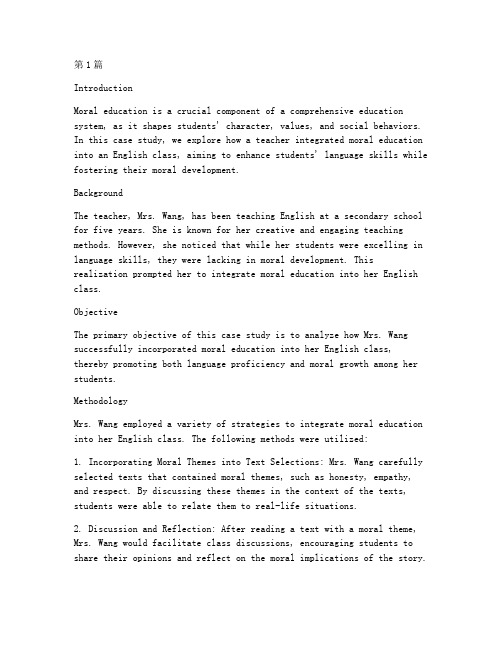
第1篇IntroductionMoral education is a crucial component of a comprehensive education system, as it shapes students' character, values, and social behaviors. In this case study, we explore how a teacher integrated moral education into an English class, aiming to enhance students' language skills while fostering their moral development.BackgroundThe teacher, Mrs. Wang, has been teaching English at a secondary school for five years. She is known for her creative and engaging teaching methods. However, she noticed that while her students were excelling in language skills, they were lacking in moral development. Thisrealization prompted her to integrate moral education into her English class.ObjectiveThe primary objective of this case study is to analyze how Mrs. Wang successfully incorporated moral education into her English class, thereby promoting both language proficiency and moral growth among her students.MethodologyMrs. Wang employed a variety of strategies to integrate moral education into her English class. The following methods were utilized:1. Incorporating Moral Themes into Text Selections: Mrs. Wang carefully selected texts that contained moral themes, such as honesty, empathy, and respect. By discussing these themes in the context of the texts, students were able to relate them to real-life situations.2. Discussion and Reflection: After reading a text with a moral theme, Mrs. Wang would facilitate class discussions, encouraging students to share their opinions and reflect on the moral implications of the story.This not only enhanced their critical thinking skills but also allowed them to develop empathy towards others.3. Role-Playing and Simulations: To further emphasize moral values, Mrs. Wang organized role-playing activities and simulations that required students to make decisions based on ethical considerations. This hands-on approach helped students internalize moral principles.4. Creative Writing Assignments: Mrs. Wang assigned creative writing tasks that required students to write stories or essays with a moral message. This enabled them to express their thoughts and feelings about moral issues while improving their writing skills.5. Homework and Projects: Students were given homework assignments and projects that focused on moral education. For instance, they were asked to research and present on ethical leaders or write essays on how they could contribute to the community.Case StudyOne particular instance that highlights the effectiveness of Mrs. Wang's approach occurred during a unit on environmental issues. The class read a story titled "The Last Tree," which depicted the consequences of deforestation and the importance of environmental conservation.After the reading, Mrs. Wang initiated a discussion on the moral implications of the story. She asked students to share their thoughts on the characters' actions and the consequences they faced. The students were divided into small groups, where they discussed the following questions:- What moral values are emphasized in the story?- How can we apply these values to our own lives?- What steps can we take to protect the environment?The discussions were lively and thought-provoking. Many students expressed a desire to become more environmentally conscious and take action to protect the planet. Mrs. Wang then assigned a creative writingtask, asking students to write a short story or essay that promoted environmental awareness.The results were impressive. Students not only demonstrated their language skills but also showcased their understanding of moral values. Many of their stories and essays highlighted the importance of taking care of the environment, showing empathy towards future generations, and making sustainable choices.ResultsThe integration of moral education into Mrs. Wang's English class yielded positive results. The following outcomes were observed:1. Enhanced Language Skills: Students' language skills, such as reading, writing, speaking, and listening, improved significantly as a result of the various activities and assignments.2. Moral Development: Students demonstrated a greater understanding of moral values and were more likely to apply them in their daily lives.3. Increased Empathy and Social Awareness: The discussions and role-playing activities enabled students to develop empathy towards others and become more socially aware.4. Improved Critical Thinking Skills: The class discussions and reflection activities encouraged students to think critically about moral issues, enhancing their problem-solving abilities.ConclusionThis case study demonstrates the effectiveness of integrating moral education into an English class. By incorporating moral themes into text selection, facilitating discussions, and engaging students in creative writing and role-playing activities, Mrs. Wang was able to foster both language proficiency and moral growth among her students. This approach serves as a valuable model for other educators seeking to enhance the holistic development of their students.第2篇IntroductionMoral education is an essential component of the educational process, aiming to cultivate students' moral values, ethical standards, andsocial responsibilities. The integration of moral education into English classes can be particularly effective, as it allows students to learn about different cultures and values through the medium of a second language. This case study explores a德育教育案例 in an English class, focusing on the theme of respect and inclusivity.BackgroundThe case study takes place in a secondary school in a multicultural city. The English class consists of 30 students, aged 14-15, from various cultural backgrounds. The teacher, Ms. Wang, has been teaching Englishfor five years and is known for her creative and engaging teaching methods.ObjectiveThe objective of this德育教育案例 is to integrate moral education into the English class, specifically focusing on the theme of respect and inclusivity. The aim is to help students understand the importance of respecting others, regardless of their cultural or social differences, and to promote a sense of inclusivity within the classroom and theschool community.Teaching MethodologyMs. Wang decided to incorporate various teaching methods to achieve the德育教育目标. These included:1. Project-Based Learning: The students were divided into groups and assigned a project on a cultural festival celebrated in their home countries. Each group was required to research the festival, create a presentation, and present it to the class. This activity aimed to foster cultural understanding and respect for different traditions.2. Discussions and Debates: Ms. Wang organized class discussions and debates on topics such as discrimination, stereotypes, and theimportance of inclusivity. Students were encouraged to express their opinions, listen to others, and engage in respectful dialogue.3. Role-Playing: Students participated in role-playing activities that simulated real-life scenarios where they had to make decisions based on respect and inclusivity. For example, they were asked to act out situations where someone was being bullied or treated unfairly.4. Reading and Analysis: The class read short stories and poems that highlighted the themes of respect and inclusivity. After reading, students discussed the characters' actions, the consequences of their decisions, and how these scenarios related to their own lives.Case StudyOne particular activity that stood out in the德育教育 process was a debate on the topic of "Is it fair to discriminate against someone based on their race or ethnicity?" The class was divided into two groups: one in favor of discrimination and the other against. Ms. Wang acted as the moderator, ensuring that both sides were given a fair opportunity to present their arguments.The debate was intense and emotional. The "discrimination" group argued that certain races or ethnicities were inherently inferior and that discrimination was necessary to maintain order and societal harmony. The "anti-discrimination" group, on the other hand, emphasized the importance of equality, the negative consequences of discrimination, and the need for inclusivity.As the debate progressed, some students from the "discrimination" group began to reconsider their positions. They realized that their arguments were based on stereotypes and generalizations, and that discrimination was harmful and unjust. By the end of the debate, the majority of the class had shifted their stance against discrimination.Reflection and EvaluationAfter the activity, Ms. Wang conducted a reflection session with the class. Students shared their thoughts and feelings about the debate, andhow it had influenced their views on discrimination and inclusivity. Many expressed a newfound appreciation for diversity and a commitment to promoting inclusivity in their daily lives.To evaluate the effectiveness of the德育教育 activity, Ms. Wang conducted a survey at the end of the term. The survey revealed that the vast majority of students had a better understanding of the importance of respect and inclusivity. Additionally, students reported feeling more comfortable discussing sensitive topics and expressing their opinions in class.ConclusionThis case study demonstrates the effectiveness of integrating moral education into the English class, using the theme of respect and inclusivity. By incorporating various teaching methods and activities, Ms. Wang was able to foster a deeper understanding of these values among her students. The success of this德育教育案例 highlights the importance of promoting moral values through language education and the potential for creating a more inclusive and respectful classroom environment.。
英语学科德育教育渗透案例(5篇)
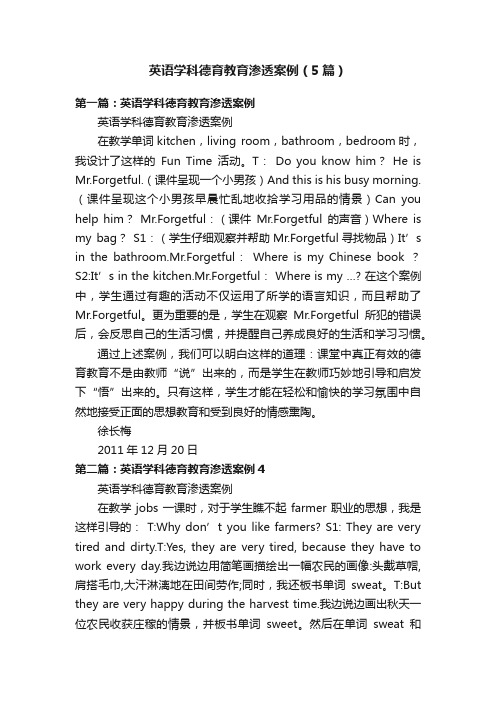
英语学科德育教育渗透案例(5篇)第一篇:英语学科德育教育渗透案例英语学科德育教育渗透案例在教学单词kitchen,living room,bathroom,bedroom时,我设计了这样的Fun Time活动。
T:Do you know him?He is Mr.Forgetful.(课件呈现一个小男孩)And this is his busy morning.(课件呈现这个小男孩早晨忙乱地收拾学习用品的情景)Can you help him?Mr.Forgetful:(课件Mr.Forgetful的声音)Where is my bag?S1:(学生仔细观察并帮助Mr.Forgetful寻找物品)It’s in the bathroom.Mr.Forgetful:Where is my Chinese book ?S2:It’s in the kitchen.Mr.Forgetful:Where is my …? 在这个案例中,学生通过有趣的活动不仅运用了所学的语言知识,而且帮助了Mr.Forgetful。
更为重要的是,学生在观察Mr.Forgetful所犯的错误后,会反思自己的生活习惯,并提醒自己养成良好的生活和学习习惯。
通过上述案例,我们可以明白这样的道理:课堂中真正有效的德育教育不是由教师“说”出来的,而是学生在教师巧妙地引导和启发下“悟”出来的。
只有这样,学生才能在轻松和愉快的学习氛围中自然地接受正面的思想教育和受到良好的情感熏陶。
徐长梅2011年12月20日第二篇:英语学科德育教育渗透案例4英语学科德育教育渗透案例在教学jobs一课时,对于学生瞧不起farmer职业的思想,我是这样引导的:T:Why don’t you like farmers? S1: They are very tired and dirty.T:Yes, they are very tired, because they have to work every day.我边说边用简笔画描绘出一幅农民的画像:头戴草帽,肩搭毛巾,大汗淋漓地在田间劳作;同时,我还板书单词sweat。
《英语教师德育案例—用爱支撑学生前行1400字》

英语教师德育案例—用爱支撑学生前行作为一名英语教师,对学生保持关爱是一种优良的道德品质,它应具备正直少却虚伪、具备无私少却自我、具备广阔少却狭隘具备爱心少却动怒;它可以使学生在逆境中得到安慰,克服困难增强信心;在顺境中更加奋发,不骄不躁,永远向前。
一、案例背景张同学三年级的时候,比较喜欢爱管闲事,似乎事事都要引起别人的注意,有事没事总是喜欢刷“存在感”,久而久之,他便呈现了这样的状态:英语学习没跟上,却常常自我纠结与找寻理由,交往上变得有些孤独,课堂上的合作常常孤身一人,性格上也变得猜疑与敏感,爱管闲事的坏习惯带来的坏处,一下子呈现出来,对英语学习没兴趣、没信心,让我非常焦头烂额。
二、分析原因1.家庭因素张同学的爷爷奶奶长时间的溺爱,而他的父母忽视了对张同学的管教。
孩子的身心发展不能被跟踪观察,也不能得到家长的陪伴,缺乏正确教育方法的引导,导致孩子价值观的偏差。
2.教师因素教师容易受到刻板印象的影响,认为如果他们的学习成绩不好,他们的道德也会很差。
因此,对落后学生的态度是比较强硬的,没有耐心根据实际情况教育他们。
如果长期忽视,落后的学生就得不到赏识,学习兴趣也会逐渐减退。
3.张同学自身的问题张同学感觉学习英语非常陌生且困难,便越来越产生厌学情绪。
三、改进举措1.爱和耐心因为他的父母经常缺席,他缺乏很多他应该拥有的爱,所以我在生活和学习上给予他更多的关心和建议,让他感觉到还有人在关心他。
与家长保持联系,定期沟通,互相关注。
心理学家认为“爱是培养好学生的前提”。
对于这样一个落后的学生,我放下架子,慢慢走近他,打开心扉,用爱去触动他的心弦,用老师的爱去温暖他,用情感去影响他,用理智去说服他。
只有这样,他才能相信老师说的话,使他对生活有新的认识,建立学习的信心。
2.因材施教“一把钥匙开一把锁”。
不同的差生有不同的原因。
只有在我们有了深刻的认识之后,我们才能因材施教,正确地引导他们。
他自制力差,讨厌老师的批评和教育。
英语教师师德教育案例(2篇)
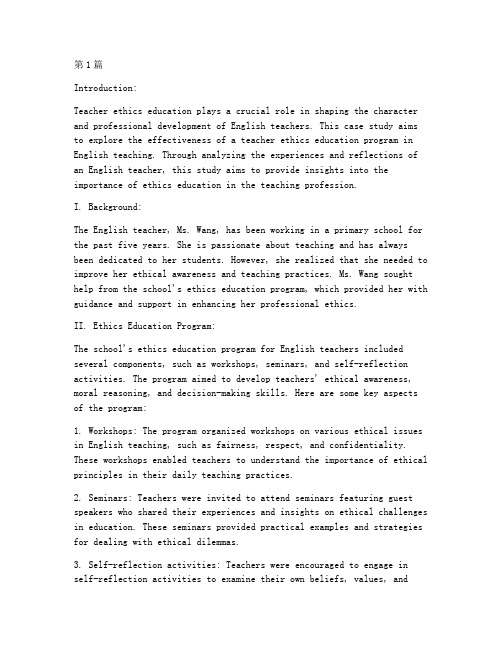
第1篇Introduction:Teacher ethics education plays a crucial role in shaping the character and professional development of English teachers. This case study aims to explore the effectiveness of a teacher ethics education program in English teaching. Through analyzing the experiences and reflections of an English teacher, this study aims to provide insights into the importance of ethics education in the teaching profession.I. Background:The English teacher, Ms. Wang, has been working in a primary school for the past five years. She is passionate about teaching and has always been dedicated to her students. However, she realized that she needed to improve her ethical awareness and teaching practices. Ms. Wang sought help from the school's ethics education program, which provided her with guidance and support in enhancing her professional ethics.II. Ethics Education Program:The school's ethics education program for English teachers included several components, such as workshops, seminars, and self-reflection activities. The program aimed to develop teachers' ethical awareness, moral reasoning, and decision-making skills. Here are some key aspects of the program:1. Workshops: The program organized workshops on various ethical issues in English teaching, such as fairness, respect, and confidentiality. These workshops enabled teachers to understand the importance of ethical principles in their daily teaching practices.2. Seminars: Teachers were invited to attend seminars featuring guest speakers who shared their experiences and insights on ethical challenges in education. These seminars provided practical examples and strategies for dealing with ethical dilemmas.3. Self-reflection activities: Teachers were encouraged to engage inself-reflection activities to examine their own beliefs, values, andbehaviors. Through journaling and group discussions, teachers were able to identify areas for improvement and develop personal ethical guidelines.III. Impact of Ethics Education on Ms. Wang:Ms. Wang's participation in the ethics education program had a profound impact on her teaching and personal growth. Here are some key changes observed in her teaching practices:1. Enhanced ethical awareness: Ms. Wang became more conscious of the ethical implications of her teaching decisions. She recognized the importance of treating all students fairly and with respect, regardless of their backgrounds or abilities.2. Improved classroom management: By understanding the ethicalprinciples of fairness and respect, Ms. Wang was able to create a more inclusive and supportive classroom environment. She implemented strategies to address bullying and promote positive interactions among students.3. Stronger relationships with students: Ms. Wang's ethical approach to teaching helped her build stronger relationships with her students. They felt more valued and supported, which led to improved learning outcomes.4. Personal growth: Through self-reflection activities, Ms. Wang gaineda deeper understanding of her own values and beliefs. This awareness allowed her to make more informed decisions and take responsibility for her actions.IV. Conclusion:This case study demonstrates the effectiveness of ethics education in English teaching. By participating in the school's ethics education program, Ms. Wang was able to enhance her ethical awareness, improve her teaching practices, and foster stronger relationships with her students. The program provided her with the tools and resources to navigateethical challenges and make a positive impact on her students' lives.Recommendations:1. Schools should prioritize ethics education in their professional development programs for teachers.2. Teacher ethics education programs should include a mix of workshops, seminars, and self-reflection activities to cater to different learning styles.3. Continuous support and guidance should be provided to teachers to ensure the sustainability of their ethical practices.4. Schools should encourage teachers to share their experiences and learn from each other's challenges and successes.In conclusion, ethics education is essential for the development of English teachers. By promoting ethical awareness and practices, teachers can create a positive and inclusive learning environment that benefits both students and themselves.第2篇Introduction:The role of an English teacher extends beyond mere language instruction; it encompasses the shaping of students' character and ethical values. This case study explores the ethical education of an English teacher, highlighting the importance of moral integrity, empathy, and professionalism in the classroom.Background:In a small suburban school in the United States, Mr. Johnson, a dedicated English teacher, faced a challenging situation that tested his ethical boundaries. With a diverse class of students from various cultural backgrounds, Mr. Johnson recognized the need to incorporate ethics education into his curriculum. This case study focuses on his approach to teaching ethics, the challenges he encountered, and the positive outcomes that resulted from his efforts.Case Description:1. The Ethical Dilemma:One day, during a class discussion on plagiarism, a student, Sarah, confessed to having copied a portion of her essay from a website without proper citation. This revelation posed an ethical dilemma for Mr. Johnson. On one hand, he was obligated to uphold academic integrity and ensure that his students understood the consequences of plagiarism. On the other hand, he was aware of Sarah's difficult home life and the potential emotional impact of such an action on her.2. Ethical Decision-Making:Mr. Johnson decided to handle the situation with sensitivity and integrity. He conducted a private conversation with Sarah, expressing his concerns about the ethical breach and the importance of honesty in academic work. He emphasized that plagiarism was not just a matter of academic integrity but also a reflection of one's character.3. Ethical Education Strategies:To reinforce the importance of ethics in his classroom, Mr. Johnson implemented several strategies:a. Incorporating Ethical Values into Curriculum:- He integrated discussions on ethical dilemmas into hisliterature classes, using classic texts as examples.- He included guest speakers from various professions to share their experiences and the ethical challenges they face.b. Role-Playing and Case Studies:- He organized role-playing activities and case studies that allowed students to explore ethical situations and practice decision-making skills.- He encouraged students to discuss their perspectives and justify their choices, fostering critical thinking and empathy.c. Encouraging Open Dialogue:- He created a safe and supportive classroom environment where students felt comfortable discussing ethical issues.- He encouraged students to ask questions and share their concerns, promoting a culture of respect and open communication.4. The Positive Outcomes:Mr. Johnson's approach to ethical education had several positive outcomes:- Sarah demonstrated a genuine understanding of the ethical implications of her actions and expressed remorse.- The class became more engaged in discussions about ethics, leading to a deeper understanding of moral values.- Other students reported feeling more confident in making ethical decisions in their personal and academic lives.- The school administration recognized the value of Mr. Johnson's approach and encouraged other teachers to adopt similar strategies.Conclusion:The case of Mr. Johnson illustrates the importance of ethical education in English language teaching. By incorporating ethics into hiscurriculum and handling difficult situations with sensitivity and integrity, Mr. Johnson not only taught his students about language but also about character and moral values. This case study serves as a reminder that teachers play a crucial role in shaping the future generation, and their commitment to ethical education can have a lasting impact on their students' lives.Reflection:As an English teacher, it is essential to recognize the power of language in shaping thoughts, emotions, and actions. By incorporating ethical education into our teaching practices, we can help our students develop a strong moral compass and become responsible, empathetic, and ethical individuals. Mr. Johnson's case study serves as an inspirationto us all, reminding us of the importance of nurturing the seed of virtue in our students.。
高中英语教师师德案例范文
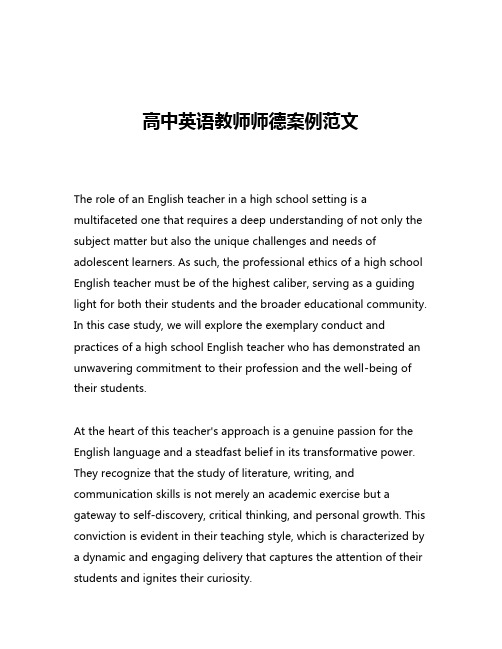
高中英语教师师德案例范文The role of an English teacher in a high school setting is a multifaceted one that requires a deep understanding of not only the subject matter but also the unique challenges and needs of adolescent learners. As such, the professional ethics of a high school English teacher must be of the highest caliber, serving as a guiding light for both their students and the broader educational community. In this case study, we will explore the exemplary conduct and practices of a high school English teacher who has demonstrated an unwavering commitment to their profession and the well-being of their students.At the heart of this teacher's approach is a genuine passion for the English language and a steadfast belief in its transformative power. They recognize that the study of literature, writing, and communication skills is not merely an academic exercise but a gateway to self-discovery, critical thinking, and personal growth. This conviction is evident in their teaching style, which is characterized by a dynamic and engaging delivery that captures the attention of their students and ignites their curiosity.One of the hallmarks of this teacher's professional ethics is their unwavering dedication to their students' academic and personal development. They understand that each student is unique, with their own strengths, weaknesses, and learning styles, and they strive to tailor their instruction accordingly. This individualized approach is manifested in their willingness to offer one-on-one support, whether it's through after-school tutoring sessions, personalized feedback on written assignments, or thoughtful guidance during class discussions.Beyond the classroom, this teacher also demonstrates a deep commitment to fostering a positive and inclusive learning environment. They actively work to create a safe space where students feel empowered to express their ideas, share their perspectives, and engage in meaningful discourse. This is achieved through the implementation of clear and consistent classroom policies, as well as a genuine respect for diversity and the unique experiences of each student.Furthermore, this teacher's professional ethics extend beyond the confines of their own classroom. They actively participate in professional development opportunities, such as workshops, conferences, and collaborative planning sessions, to continually hone their craft and stay abreast of the latest pedagogical best practices. This commitment to lifelong learning not only benefits their studentsbut also contributes to the overall growth and improvement of the school's English department.Perhaps one of the most remarkable aspects of this teacher's professional ethics is their unwavering commitment to the well-being of their students. They recognize that academic success is not solely measured by test scores or grades, but rather by the holistic development of the individual. As such, they make a concerted effort to address the social-emotional needs of their students, offering guidance, support, and a listening ear when challenges arise.This compassionate approach is particularly evident in the way this teacher handles sensitive situations, such as instances of bullying, mental health struggles, or personal crises. They approach these situations with empathy, discretion, and a deep understanding of the complexities involved. Rather than simply referring students to other support services, this teacher actively collaborates with counselors, administrators, and parents to ensure that each student receives the personalized attention and resources they need to navigate these challenges successfully.Additionally, this teacher's professional ethics are reflected in their commitment to maintaining the highest standards of integrity and ethical conduct. They are unwavering in their adherence to school policies, district regulations, and state educational laws, recognizingthe importance of upholding the trust and expectations of the broader educational community. This includes a steadfast commitment to protecting student privacy, accurately reporting student progress, and ensuring that all academic assessments and evaluations are conducted with the utmost fairness and objectivity.Perhaps most importantly, this teacher's professional ethics are rooted in a deep respect for the teaching profession and the vital role it plays in shaping the lives of young people. They understand that their actions and decisions have a profound impact on the future of their students, and they approach their work with a profound sense of responsibility and purpose. This is evident in their willingness to go above and beyond the basic requirements of their job, whether it's volunteering for extracurricular activities, serving on school committees, or advocating for the needs of their students at the district or state level.In conclusion, the case study of this high school English teacher serves as a shining example of the transformative power of professional ethics in the field of education. Through their unwavering commitment to their students, their subject matter, and the broader educational community, this teacher has not only inspired their students to reach new heights but has also set a standard of excellence that serves as a beacon for their peers and the teaching profession as a whole. By emulating the principles andpractices of this exemplary educator, high school English teachers can strive to cultivate a learning environment that fosters academic excellence, personal growth, and a deep appreciation for the transformative power of the English language.。
初中英语师德教育工作案例范文

初中英语师德教育工作案例范文Teaching is a noble profession that not only imparts knowledge but also shapes the character and values of young minds. As middle school English teachers, we have a profound responsibility to not only teach the language but also instill in our students a strong sense of ethics and moral values. This case study examines the efforts of a dedicated middle school English teacher, Ms. Emily, in implementing a comprehensive professional ethics education program for her students.Ms. Emily has been teaching English at a local middle school for the past ten years. Throughout her career, she has been recognized for her exceptional teaching abilities and her unwavering commitment to the holistic development of her students. However, she has always felt that the aspect of professional ethics education has been somewhat neglected in the curriculum. Driven by her passion for nurturing well-rounded individuals, Ms. Emily decided to take matters into her own hands and design a comprehensive program that would address this gap.The first step in Ms. Emily's initiative was to conduct a thorough assessment of the existing ethical standards and practices in her school. She engaged with her colleagues, the school administration, and the community to understand their perspectives on the importance of professional ethics education. The feedback she received was overwhelmingly positive, with everyone acknowledging the need for a more structured and intentional approach to this crucial aspect of student development.Armed with this valuable information, Ms. Emily set out to develop a comprehensive professional ethics education program that would be integrated into her English language curriculum. She began by identifying the core ethical principles that she wanted to instill in her students, such as integrity, respect, responsibility, and empathy. These principles were then woven into the various components of her English lessons, from reading comprehension exercises to creative writing assignments.One of the standout features of Ms. Emily's program was the emphasis on real-world case studies and role-playing activities. She carefully curated a collection of scenarios that highlighted ethical dilemmas and challenged her students to analyze the situation, consider multiple perspectives, and propose viable solutions. These interactive sessions not only engaged the students but also encouraged them to think critically and develop their decision-making skills.Another key aspect of Ms. Emily's approach was the integration of guest speakers and community resources. She invited professionals from various fields, such as lawyers, journalists, and social workers, to share their experiences and insights on the importance of professional ethics. These sessions provided the students with a deeper understanding of the practical applications of ethical principles in different contexts.To further reinforce the lessons learned, Ms. Emily encouraged her students to participate in community service projects that aligned with the ethical values they were exploring. These hands-on experiences allowed the students to apply their knowledge and make a positive impact on their local community, fostering a sense of civic responsibility and social awareness.Throughout the implementation of the professional ethics education program, Ms. Emily maintained open communication with parents and guardians. She organized regular parent-teacher meetings to discuss the progress of the program and address any concerns or questions they might have. This collaborative approach ensured that the students received consistent messaging and support from both the school and the home environment.The results of Ms. Emily's efforts were truly remarkable. Over the course of the academic year, her students demonstrated a noticeable improvement in their ethical decision-making skills, their ability to navigate complex situations, and their overall sense of social responsibility. The school administration also recognized the positive impact of the program, and it was soon adopted as a model for other middle schools in the district.Perhaps the most heartening aspect of this case study is the lasting impact it had on the students. Many of them continued to apply the ethical principles they had learned long after they had graduated from Ms. Emily's class. Some even went on to pursue careers in fields that directly involved the application of professional ethics, such as law, education, and social work.In conclusion, the case study of Ms. Emily's professional ethics education program serves as a shining example of the transformative power of intentional and comprehensive character development initiatives in middle school education. By seamlessly integrating ethical principles into the English language curriculum, Ms. Emily was able to cultivate a generation of students who not only excelled academically but also possessed a strong moral compass and a deep sense of social responsibility. This holistic approach to education is a testament to the profound impact that dedicated and visionary teachers can have on the lives of their students.。
2024年师德师风深度解析英文版

2024年师德师风深度解析英文版In-depth Analysis of Teacher Ethics and Professionalism in 2024The year 2024 brings new challenges and opportunities for educators to uphold and strengthen their teacher ethics and professionalism. As we delve into the intricacies of this topic, it is essential to understand the critical role that teacher conduct plays in shaping the learning environment and student outcomes.Teacher ethics encompass a wide range of principles and values that guide educators in their interactions with students, colleagues, and the community. These ethical standards serve as a foundation for professionalism in the field of education and help maintain trust and respect within the educational setting.In 2024, it is crucial for teachers to prioritize integrity, honesty, and fairness in their daily practices. By demonstrating ethical behavior, educators can build strong relationships with students, foster a positivelearning environment, and instill values of respect and responsibility in the classroom.Furthermore, teacher professionalism involves more than just following a code of conduct. It requires continuous learning, reflection, and growth to adapt to the evolving needs of students and society. In 2024, educators must embrace innovation, diversity, and inclusivity in their teaching practices to promote student success and well-being.To deepen our understanding of teacher ethics and professionalism in 2024, it is essential to examine case studies, research findings, and best practices in the field of education. By analyzing real-world scenarios and exploring ethical dilemmas, educators can enhance their decision-making skills and strengthen their commitment to upholding high standards of conduct.In conclusion, the year 2024 presents a unique opportunity for educators to reflect on their teacher ethics and professionalism and strive for excellence in their practice. By embracing ethical principles, fostering professionalism, and engaging in continuous learning, teacherscan positively impact student learning outcomes and contribute to the overall success of the education system.。
教师师德工作案例范文
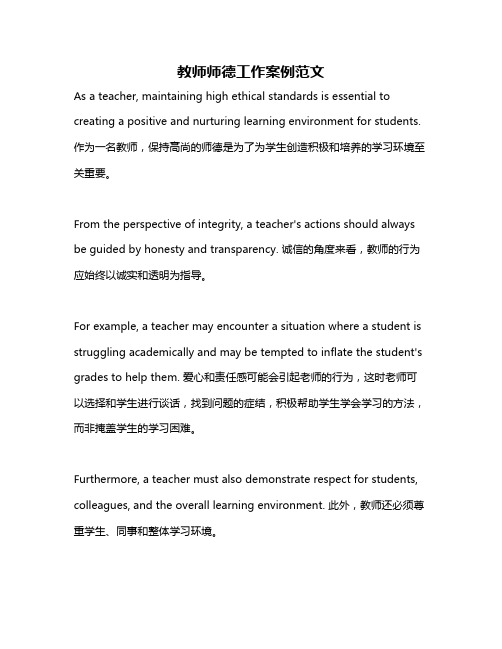
教师师德工作案例范文As a teacher, maintaining high ethical standards is essential to creating a positive and nurturing learning environment for students. 作为一名教师,保持高尚的师德是为了为学生创造积极和培养的学习环境至关重要。
From the perspective of integrity, a teacher's actions should always be guided by honesty and transparency. 诚信的角度来看,教师的行为应始终以诚实和透明为指导。
For example, a teacher may encounter a situation where a student is struggling academically and may be tempted to inflate the student's grades to help them. 爱心和责任感可能会引起老师的行为,这时老师可以选择和学生进行谈话,找到问题的症结,积极帮助学生学会学习的方法,而非掩盖学生的学习困难。
Furthermore, a teacher must also demonstrate respect for students, colleagues, and the overall learning environment. 此外,教师还必须尊重学生、同事和整体学习环境。
An example of this could be seen in the way a teacher interacts with their colleagues, refraining from engaging in gossip or negative talk about others. 对同事的尊重也能反映到不参与传播流言蜚语或对他人进行负面评价。
5篇师德师风的学习体验与思考英文版
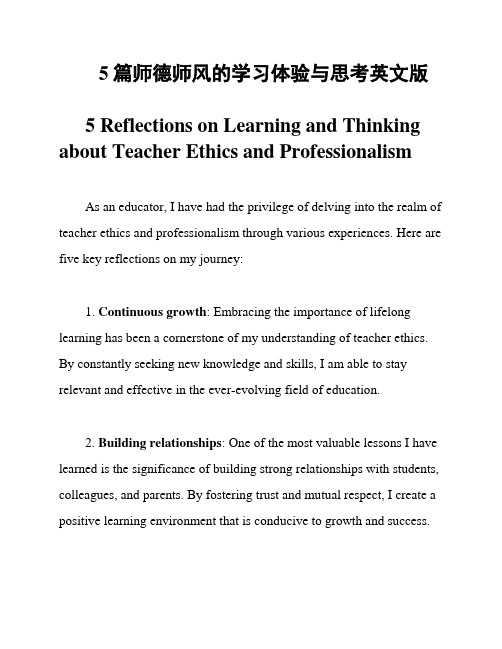
5篇师德师风的学习体验与思考英文版5 Reflections on Learning and Thinking about Teacher Ethics and Professionalism As an educator, I have had the privilege of delving into the realm of teacher ethics and professionalism through various experiences. Here are five key reflections on my journey:1. Continuous growth: Embracing the importance of lifelong learning has been a cornerstone of my understanding of teacher ethics. By constantly seeking new knowledge and skills, I am able to stay relevant and effective in the ever-evolving field of education.2. Building relationships: One of the most valuable lessons I have learned is the significance of building strong relationships with students, colleagues, and parents. By fostering trust and mutual respect, I create a positive learning environment that is conducive to growth and success.3. Setting boundaries: Establishing clear boundaries and maintaining professionalism in all interactions is essential for upholding ethical standards. By adhering to a code of conduct and ethical guidelines, I ensure that my actions are always in the best interest of my students and the school community.4. Reflective practice: Engaging in reflective practice allows me to critically analyze my teaching methods, decisions, and interactions. By regularly reflecting on my actions and seeking feedback from peers, I am able to continuously improve and grow as an educator.5. Leading by example: As a teacher, I understand the importance of leading by example and modeling the behavior and values I wish to instill in my students. By demonstrating integrity, honesty, and empathy, I inspire my students to embody these qualities and become responsible members of society.In conclusion, my journey of learning and thinking about teacher ethics and professionalism has been transformative and enriching. By embracing continuous growth, building relationships, setting boundaries,practicing reflection, and leading by example, I strive to uphold the highest ethical standards in my role as an educator.。
师德师风的作文英文初一
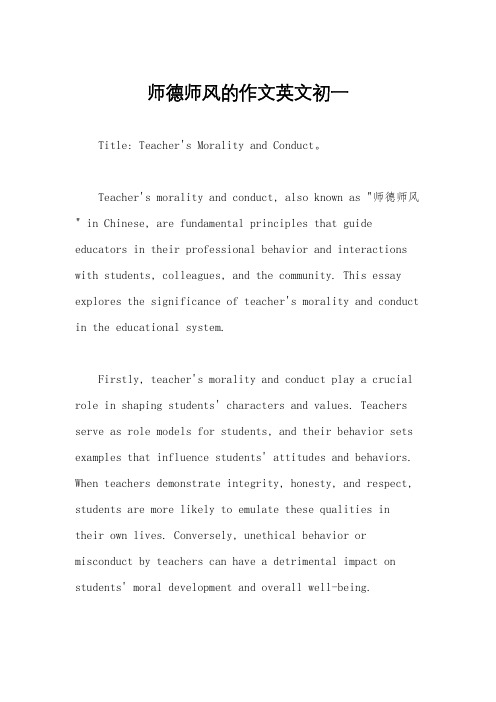
师德师风的作文英文初一Title: Teacher's Morality and Conduct。
Teacher's morality and conduct, also known as "师德师风" in Chinese, are fundamental principles that guide educators in their professional behavior and interactions with students, colleagues, and the community. This essay explores the significance of teacher's morality and conduct in the educational system.Firstly, teacher's morality and conduct play a crucial role in shaping students' characters and values. Teachers serve as role models for students, and their behavior sets examples that influence students' attitudes and behaviors. When teachers demonstrate integrity, honesty, and respect, students are more likely to emulate these qualities intheir own lives. Conversely, unethical behavior or misconduct by teachers can have a detrimental impact on students' moral development and overall well-being.Secondly, teacher's morality and conduct contribute to the establishment of a positive learning environment. When teachers uphold high ethical standards and treat students with fairness and kindness, it fosters a sense of trust and mutual respect in the classroom. This conducive atmosphere promotes student engagement, participation, and academic achievement. Conversely, a lack of integrity or professionalism among teachers can create a negative learning environment characterized by distrust, apathy, and disciplinary issues.Furthermore, teacher's morality and conduct are essential for maintaining the credibility and reputation of the educational institution. Teachers are entrusted with the responsibility of nurturing young minds and preparing them for the future. Therefore, it is imperative that they adhere to ethical principles and professional standards in their interactions with students, parents, and the wider community. Any breach of trust or misconduct by teachers not only damages their own reputation but also tarnishes the reputation of the school or institution they represent.Moreover, teacher's morality and conduct are integralto fostering positive relationships with colleagues and stakeholders in the education sector. Collaboration and teamwork among educators are essential for effective teaching and learning. When teachers demonstrate respect, cooperation, and collegiality, it enhances the overall morale and productivity of the school community. Conversely, conflicts or disagreements stemming from unethical behavior or misconduct can undermine teamwork and hinder the attainment of educational goals.In conclusion, teacher's morality and conduct are indispensable elements of the educational system. They not only influence students' moral development and academic success but also contribute to the overall effectivenessand reputation of educational institutions. Therefore, itis imperative for educators to uphold high ethicalstandards and demonstrate exemplary behavior in their professional roles. By doing so, they can fulfill theirduty to nurture future generations and contributepositively to society.。
师德师风的作文英文初一
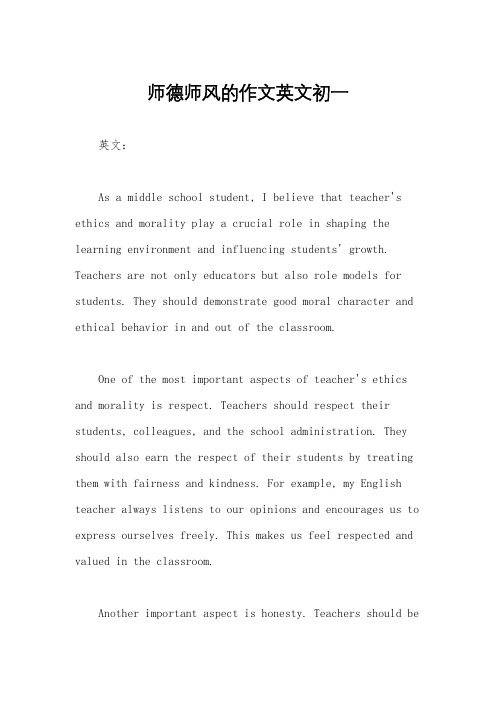
师德师风的作文英文初一英文:As a middle school student, I believe that teacher's ethics and morality play a crucial role in shaping the learning environment and influencing students' growth. Teachers are not only educators but also role models for students. They should demonstrate good moral character and ethical behavior in and out of the classroom.One of the most important aspects of teacher's ethics and morality is respect. Teachers should respect their students, colleagues, and the school administration. They should also earn the respect of their students by treating them with fairness and kindness. For example, my English teacher always listens to our opinions and encourages us to express ourselves freely. This makes us feel respected and valued in the classroom.Another important aspect is honesty. Teachers should behonest in their interactions with students and colleagues. They should not cheat, lie, or manipulate others for personal gain. For instance, my math teacher always admits when she makes a mistake and apologizes to the class. This shows her honesty and integrity, which earns our trust and respect.Furthermore, teachers should be responsible and dedicated to their profession. They should strive to provide quality education and support to their students. For example, my history teacher stays after school to help students who are struggling with the subject. This dedication and responsibility make us feel cared for and motivated to learn.In addition, teachers should be fair and just in their treatment of students. They should not show favoritism or discriminate against any student. For example, my science teacher always gives equal opportunities to every student to participate in class activities and assignments, regardless of their background or academic performance.In conclusion, teacher's ethics and morality are essential for creating a positive and nurturing learning environment. When teachers demonstrate respect, honesty, responsibility, dedication, fairness, and justice, they not only inspire students to become better individuals but also contribute to the overall well-being of the school community.中文:作为一个中学生,我相信师德师风在塑造学习环境和影响学生成长方面起着至关重要的作用。
关于师德风范的英语作文
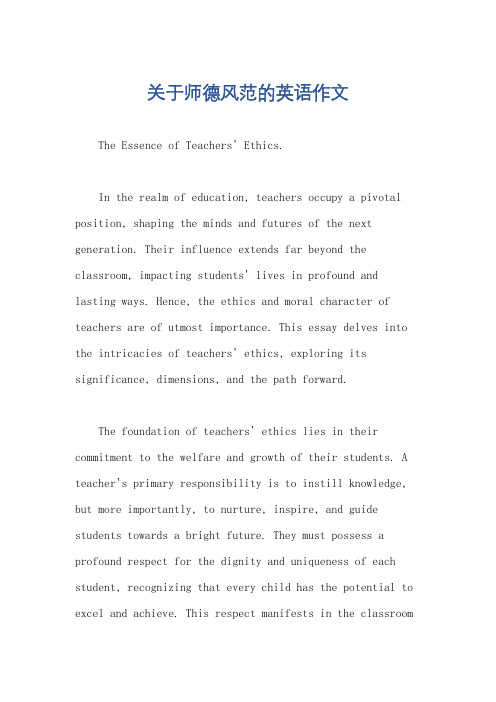
关于师德风范的英语作文The Essence of Teachers' Ethics.In the realm of education, teachers occupy a pivotal position, shaping the minds and futures of the next generation. Their influence extends far beyond the classroom, impacting students' lives in profound and lasting ways. Hence, the ethics and moral character of teachers are of utmost importance. This essay delves into the intricacies of teachers' ethics, exploring its significance, dimensions, and the path forward.The foundation of teachers' ethics lies in their commitment to the welfare and growth of their students. A teacher's primary responsibility is to instill knowledge, but more importantly, to nurture, inspire, and guide students towards a bright future. They must possess a profound respect for the dignity and uniqueness of each student, recognizing that every child has the potential to excel and achieve. This respect manifests in the classroomthrough inclusive teaching methods, fair evaluation criteria, and a non-judgmental approach towards student's diverse abilities and backgrounds.Moreover, teachers must demonstrate integrity in all their dealings. They should be honest in their teaching, avoiding the dissemination of misinformation or biased opinions. They should also uphold ethical standards intheir professional conduct, maintaining transparency in grading, assignments, and evaluations. By practicing integrity, teachers set an example for their students, instilling in them the values of honesty, fairness, and responsibility.Patience and understanding are also essential qualities of teachers' ethics. Dealing with a diverse range of students, each with their unique challenges and learning styles, requires immense patience and the ability to empathize. Teachers must be willing to go the extra mile, investing time and effort to understand students' needs and challenges. They should encourage students to think critically, fostering a classroom environment that isconducive to learning and exploration.Furthermore, teachers must be lifelong learners, constantly updating their knowledge and skills. The rapidly evolving world demands teachers who are adaptable, innovative, and willing to embrace change. By staying up-to-date with new technologies, teaching methods, and research, teachers can ensure that their students are equipped with the latest knowledge and skills necessary for success in the 21st century.In addition, teachers should foster a sense of community and belonging among their students. They should create a classroom environment that is inclusive, respectful, and welcoming, where students feel valued and motivated to contribute. By promoting positiverelationships and collaboration among students, teachers can help shape a generation that is united, compassionate, and ready to face the challenges of the future.In conclusion, the ethics of teachers are pivotal in shaping the lives of their students and the society atlarge. By committing to the welfare of their students, practicing integrity, exhibiting patience and understanding, being lifelong learners, and fostering a sense of community, teachers can instill in their students the values andskills necessary for a bright and fulfilling future. It is the responsibility of teachers to uphold these ethical standards, modeling the way for a new generation of leaders and thinkers.。
教师师德反思模板英语
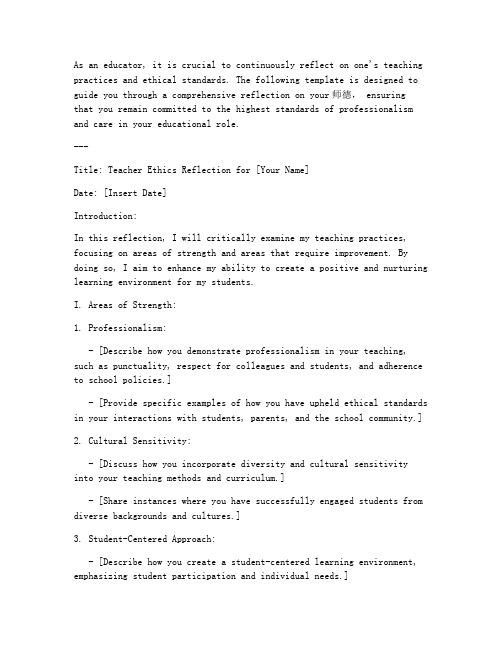
As an educator, it is crucial to continuously reflect on one's teaching practices and ethical standards. The following template is designed to guide you through a comprehensive reflection on your师德, ensuringthat you remain committed to the highest standards of professionalism and care in your educational role.---Title: Teacher Ethics Reflection for [Your Name]Date: [Insert Date]Introduction:In this reflection, I will critically examine my teaching practices, focusing on areas of strength and areas that require improvement. By doing so, I aim to enhance my ability to create a positive and nurturing learning environment for my students.I. Areas of Strength:1. Professionalism:- [Describe how you demonstrate professionalism in your teaching, such as punctuality, respect for colleagues and students, and adherence to school policies.]- [Provide specific examples of how you have upheld ethical standards in your interactions with students, parents, and the school community.]2. Cultural Sensitivity:- [Discuss how you incorporate diversity and cultural sensitivityinto your teaching methods and curriculum.]- [Share instances where you have successfully engaged students from diverse backgrounds and cultures.]3. Student-Centered Approach:- [Describe how you create a student-centered learning environment, emphasizing student participation and individual needs.]- [Provide examples of strategies you use to cater to different learning styles and abilities.]II. Areas for Improvement:1. Behavior Management:- [Identify areas where you may struggle with classroom management and discuss potential strategies to improve this.]- [Reflect on how you can better address student behavior issues in a fair and constructive manner.]2. Professional Development:- [Discuss opportunities for professional growth and how you plan to continue developing your teaching skills and knowledge.]- [Consider how you can stay updated with the latest educational research and incorporate new findings into your teaching.]3. Parent Communication:- [Reflect on your communication with parents and identify areas where you can improve.]- [Consider how you can establish a more consistent and effective dialogue with parents to support their child's learning.]III. Action Plan:1. Immediate Actions:- [List specific steps you will take to address the areas for improvement identified above.]- [Include timelines and goals for these actions.]2. Long-Term Goals:- [Outline your long-term professional goals and how you plan to achieve them.]- [Consider how these goals align with your ethical commitment to teaching.]Conclusion:Through this reflection, I have gained valuable insights into my teaching practices and the areas where I can grow as an educator. I am committed to continuously improving my skills and ethical standards to provide the best possible learning experience for my students. By implementing the action plan outlined above, I aim to become a more effective and ethical teacher.---This template serves as a guide for your reflection, but feel free to adapt it to suit your personal experiences and needs. Remember, ongoing self-assessment is key to maintaining high ethical standards in the field of education.。
高中英语教师师德案例范文

高中英语教师师德案例范文English:As a high school English teacher, it is crucial to uphold the highest standard of professional ethics. One case that showcases good teacher ethics is when a teacher goes above and beyond to support and encourage struggling students. For example, a teacher who notices a student continuously struggling with a particular concept takes the initiative to provide extra resources, one-on-one tutoring, and regular check-ins to ensure the student's success. Additionally, the teacher maintains confidentiality and provides emotional support to the student, fostering a safe and trusting environment. By demonstrating such dedication and care, the teacher not only upholds professional ethics but also sets a positive example for the students, showing them the importance of empathy, support, and going the extra mile for others.中文翻译:作为一名高中英语教师,维护最高标准的职业道德至关重要。
小学英语师德案例
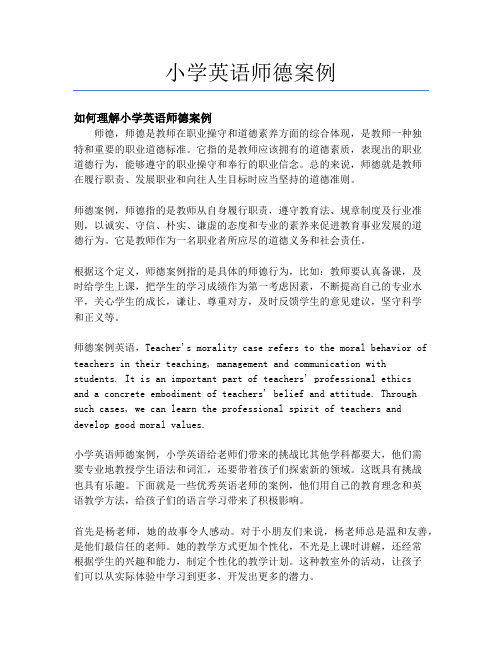
小学英语师德案例如何理解小学英语师德案例师德,师德是教师在职业操守和道德素养方面的综合体现,是教师一种独特和重要的职业道德标准。
它指的是教师应该拥有的道德素质,表现出的职业道德行为,能够遵守的职业操守和奉行的职业信念。
总的来说,师德就是教师在履行职责、发展职业和向往人生目标时应当坚持的道德准则。
师德案例,师德指的是教师从自身履行职责,遵守教育法、规章制度及行业准则,以诚实、守信、朴实、谦虚的态度和专业的素养来促进教育事业发展的道德行为。
它是教师作为一名职业者所应尽的道德义务和社会责任。
根据这个定义,师德案例指的是具体的师德行为,比如:教师要认真备课,及时给学生上课,把学生的学习成绩作为第一考虑因素,不断提高自己的专业水平,关心学生的成长,谦让、尊重对方,及时反馈学生的意见建议,坚守科学和正义等。
师德案例英语,Teacher's morality case refers to the moral behavior of teachers in their teaching, management and communication with students. It is an important part of teachers' professional ethicsand a concrete embodiment of teachers' belief and attitude. Through such cases, we can learn the professional spirit of teachers and develop good moral values.小学英语师德案例,小学英语给老师们带来的挑战比其他学科都要大,他们需要专业地教授学生语法和词汇,还要带着孩子们探索新的领域。
这既具有挑战也具有乐趣。
下面就是一些优秀英语老师的案例,他们用自己的教育理念和英语教学方法,给孩子们的语言学习带来了积极影响。
- 1、下载文档前请自行甄别文档内容的完整性,平台不提供额外的编辑、内容补充、找答案等附加服务。
- 2、"仅部分预览"的文档,不可在线预览部分如存在完整性等问题,可反馈申请退款(可完整预览的文档不适用该条件!)。
- 3、如文档侵犯您的权益,请联系客服反馈,我们会尽快为您处理(人工客服工作时间:9:00-18:30)。
师德案例分析
最近,我读了一些有关师德的文章,感触颇深。
接下来,我想谈几个让我印象深刻的教师及他们的事迹。
事迹一:
爱心耕耘矢志不渝
爱,是人类特有的情感和行为,是生活深处一朵美丽的鲜花。
它能创造出安全与满足的温馨,赋予人以无穷大的力量。
师爱,是教育领域中最关键的一种爱,是学生热爱学习的强动力,是学生人格的助长剂。
她——顾红妹老师,以“关爱学生,为学生排忧解难”作为自己工作的重心,及时发现学生在情绪行为上细致的变化,与学生进行了有效沟通,与家长共同配合,解除学生心理上的障碍;在学生日常小事中,她注意捕捉最佳教育时机,深受家长学生欢迎。
教师是人类灵魂的工程师,师德是教师之魂,“以德育人,用心授业”是她对师德的具体诠释。
“学生的快乐就是我的快乐”、“每个学生都是我的孩子”是她内心情感的真实流露,更是工作准则。
小明是个外地孩子,学习成绩很差,但他的智力并不差,这是怎么回事?顾老师通过了解、观察,发现主要原因是他的家庭环境不好。
父亲忙着做生意,整天早出晚归。
母亲天天搓麻将,连正常的三餐都不能保证,更别提学习。
于是顾老师抽空一次又一次去家访,晓之以理,动之以情,他的父母终于被真情感动。
母亲再三保证,孩子在家,不再搓麻将了。
他父亲也说,生意再忙,也要挤出时间陪陪孩子。
由于环境改善,小明能安心地学习了,学习成绩有了明显提高。
顾老师用爱心去浇灌学生,了解学生,转化学生,做到不让一个学生掉队。
小鑫——一一年级的新生,入学没久,顾老师发现孩子的行为习惯很差。
上课自言自语,作业拖拖拉拉;下课调皮捣蛋,时常搞些恶做剧,小朋友们都不愿和他玩。
于是,顾老师走访了他的家。
通过交谈,了解到小鑫的父母中年得子,非常宠爱,是家里的小皇帝。
找到了问题的症结,顾老师同小鑫父母做了一次长谈,家长过分地溺爱孩子,很可能害了孩子。
小鑫父母纷纷表示要改变这种教育方法,感谢顾老师及时地和他们联系,否则真是不堪设想。
一个多月过去了,小鑫有了明显的进步。
顾老师的爱,总是及时地出现在学生有困难的时候,当学生的思想因为疑惑而陷入迷惘时,当学生的情感因为受了挫折而恐惧不安时,当学生的心灵受了打击而一蹶不振时,她总是用她那无私的爱帮助学生点一盏灯,指引方向,寻一把钥匙,开启心锁,送一些鼓励,找回自信。
三迟讲台上顾老师拥有了一份无悔的青春。
事迹二:
用爱心托起明天的太阳
“用爱心,托起明天的太阳”这句话,是浦江一小张英老师的座右铭,她十年如一日地用自己的爱心,去热爱工作、热爱孩子,在教书育人、班级管理、教学改革研究等方面,取得了一定的成绩。
她用爱心、耐心,更用慧心把梦想变成了现实。
她曾经多次获闵行区记大功、记功,2005年获可爱的闵行教师称号,所带班级获闵行区优秀中队,本人获区优秀中队辅导员称号,被授予爱生模范等称号,年年被评为校优秀德育工作者,。
倾情奉献,创建良好班集体
她连续做了十六年的班主任工作,以身作则,为人师表,工作兢兢业业,培养了一个又一个良好的班集体。
①以人格的魅力感染学生,要求学生做到的,她必先做到。
扶贫、助残、救灾捐款每回都走在最前面;主动为班级买拖布、毛巾;班里的脏活、累活带头干,从不袖手旁观。
②以公平的制度管理学生,对待学生一视同仁,为学生创造一个平等合理的学习生活氛围。
③用持之以恒的劲头管理班级。
从开学之日起到学期末,每天都坚持晨检,及时总结学生表现,让学生交流自己的“成长足迹”,发现问题及时纠正。
④开展活动,提高学生素质。
为提高学生思想道德认识,加强小学生道德内化,她利用班队会,午休中队会,组织学生学习三字经、学古诗、背成语、诵名言名句,使学生从中领略祖国山川的秀美,感悟人生的真谛,陶冶学生的情操。
每名学生都能吟诵古诗几十首,背名言名句几十条,成语上百句,形成了本班的特色。
班主任的工作非常细碎又繁琐,然而张老师就是在这样一个平凡的岗位上兢兢业业地做出了不平凡的事,虽然这些事看似普通,但却是那样的实实在在。
用宽容感化学生
在这十六年的班主任工作中,她的工作作风,她的工作热情令人折服。
我曾经听她讲过这么一个故事:记得一堂语文课上她在实物投影前,一边分析语文试卷,一边操作着,讲得甚是投入时猛一抬头,差点把她气晕过去,坐在最后一排的小吴和小思同学,竟隔着一条走廊两人各拉着一条绳子的一头,正起劲地甩着。
脸上还一脸的微笑。
见她突然抬头,也愣住了,手拽着绳子不知所措。
她怒气冲天地冲过去,一把夺过她们手中的绳子,嗓门也提高了八度,甩下一句:“下课了,去办公室。
”下了课,两人怯怯地来到办公室,因为隔了一些时间,她心头的怒火,也没一开始那么旺,张老师一言不发地看着她们,她们被老师看得渐渐低下了头。
许久,她用一种平和的语气说:“你们太令张老师失望了。
在老师的眼中,你们可都是好学生,是小朋友学习的榜样,今天竟然做出这种行为来,真令老师失望。
”听了老师的话,其中一个眼泪扑簌簌的下来了,过了一会儿,另一个的眼圈也红了。
“张老师知道你们都喜欢运动,你们俩跳绳也跳得不错,但是是不是要分清场合呢?”两人不约而同地点了点头。
这样吧,今天的事老师就不向你们父母反映了,但你们得答应我下不为例。
“小吴一边哭泣一边说:”我以后不会这样。
“小思也赶忙表示:”我以后上课一定认真听。
“她露出欣慰的笑容,说道:“老师相信你们。
”
多学科并进,在素质教育教学中取得了累累硕果
她在十多年的教学工作中,一方面钻研教材,不断总结教学实践经验,提高教学能力;另一方面积极参加高层次学习,不断提高自己科学文化素质和理论水平。
并较熟练地运用电脑等现代教学媒体进行教学,她教一科、钻一科、爱一科,不断地认真学习新知,学习别人的先进经验,及时总结自己教育教学上的得失,使自己的能力与水平在总结、实践、再总结的过程中不断地提高。
在参加的各类比赛中均成绩卓著。
她具有很强的教育教学能力,在教学过程中,她对每一个活动的每一个环节,都是精心设计,力求使每一个教学活动都能体现新的教育理念,符合孩子的身心发展特点。
在活动中,做到因材施教,坚持正面教育和面向全体教育,以生动、新颖的教学方式和高超的教学水平唤起每一个孩子活动的积极性与主动性,发挥他们的创造力,使孩子们在轻松愉快的气氛中获取新知、发展能力,养成了良好的品质。
爱是人类最美好的语言
张老师认为:爱是人类最美好的语言。
在教育中,老师的爱是孩子最宝贵的营养。
孩子是非常敏感的,可塑性也是非常大的,她们需要的并不多,一个甜甜的微笑、一个轻轻的抚摸,一种赞扬的目光……它都可以使孩子认识自己、肯定自己、充满自信,从而感到快乐和幸福。
因此,她每天都以微笑面对孩子,她的微笑就象灿烂的阳光一样洒向每个孩子的心田。
“功夫不负有心人。
”孩子们在张老师的爱的抚慰下,个个都从原来的任性、幼稚到懂事、健康,成为人见人爱的好孩子。
她们也给老师回报了十分出色的礼物:凡参加各级各类比赛,均取得非常优异的成绩。
扎实的教育技能,同样也赢得了孩子的无限崇拜与热爱,他们无不自豪地说:“我们张老师是最棒的!”
张老师为人师表,师德高尚,在与孩子一起成长的岁月里,她尊重每一个孩子,关心爱护所有的孩子,做到一视同仁,并善于捕捉每一个孩子身上的闪亮点,以“成功教育”的教育思想指导自己。
春夏秋冬,她一直用自己的爱心、耐心和细心,让孩子们在享受着童年的乐趣中,健康快乐地成长。
曾有人这样问她:“对于教师而言,什么是幸福?”她微笑着回答:“学生的喜欢,家长的信任是一个教师的最大幸福。
”在十多年的教学生涯中,很多已上中学的孩子,每当节假日来临时,都会寄来贺卡来问候,还有家长特意来看望她以表达自己的感激之情,好多老师也都特别羡慕地对她说“张老师,就数你的学生最好了,还记得自己小学的老师。
”张老师常说:“只有真正付出了爱,才会得到最真挚的回报。
”虽然孩子毕业走了,但是她的朋友却成倍成倍地增多,因为不光是孩子,家长们也都跟她成了非常要好的朋友。
正如张老师所说的那样,这就是作为一名教师的幸福所在吧!确实,作为一名人民教师,是无法用学生的考试成绩来衡量她的工作,而孩子与家长的认可应该是最好的肯定吧!
“用爱心,托起明天的太阳”,张老师是这样想,也是这样做的。
她说:“我的手掌虽小,但我要尽力托起祖国明天的太阳;我的身躯并不伟岸,但我会努力用爱心撑起这一片蓝天。
”……
这两位教师就是我们教育工作的普通的一员,但是他们的事迹却让我为之感动,更值得我去学习。
也许我们在平时的工作中也会遇到相似的事情,可是我们会不会也用这个的态度与方法去这样做呢?看了两位教师的故事,我的心久久不能平静,他的不仅让我感动,让我敬佩更让我惭愧。
也许教育工作是辛苦的,可是报酬却是微薄的;也许教育工作是甜美的,但是开花结果的时间却是漫长的;也许教师的职业是平凡的,可是工作的内容却是伟大的……
可是无论怎样,教师的工作却是不可倦怠的。
而唯一的途径就是用爱去面对学生,用责任去约束工作。
让们的学生都在爱的陪伴下健康成长吧!。
